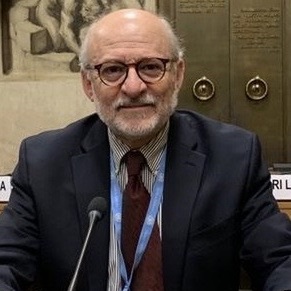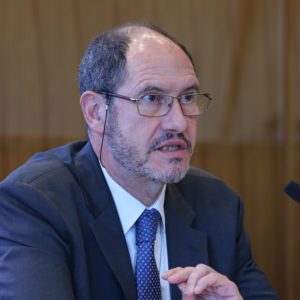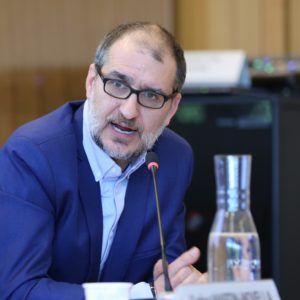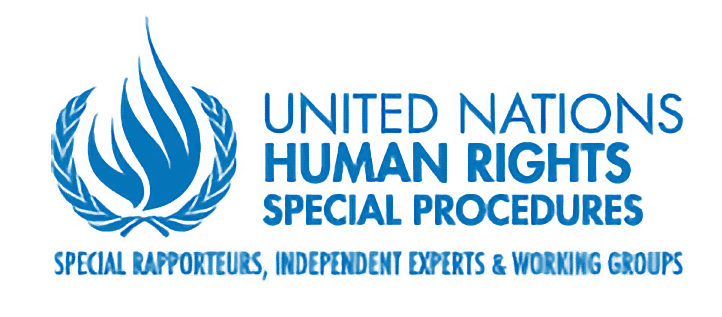Event Virtual
HRC48 Side Event | Plastics and Human Rights

23 Sep 2021
13:30
Venue: Online | Webex
This virtual side-event to the 48th Session of the Human Right Council, was convened by the Special Rapporteur on Toxics and Human Rights, Marcos Orellana, within the framework of the Geneva Beat Plastic Pollution Dialogues and Geneva Toxic Free Talks, and co-sponsored by Ecuador and the European Union. In view of upcoming debates on whether to initiate negotiations toward a new plastics treaty at the next UN Environment Assembly in February 2022, this timely event explored the impacts of plastics on human rights, as well as the elements of a human rights-based approach in a new legally binding global instrument.
About this Session
Over the past few years, numerous scientific studies have revealed the magnitude of the threat of plastics for people and the environment. The evidence regarding the volume of plastic production and the toxic additives in plastics is clear and overwhelming.
The complexity of plastics is unlike other problems that the international community has confronted. Indeed, the plastic crisis involves issues of biodiversity, technology and trade, among others. But plastics also have serious impacts on people and their rights.
Every stage of the plastic lifecycle affects human rights. These impacts include toxic pollution released in manufacturing, exposure to toxic additives in plastic consumer products, and waste mismanagement. Human rights principles are thus critical to support legitimate and effective responses.
Human rights principles can and should be involved in the transition towards a chemically safe circular economy. For example, extended producer responsibility arrangements, that apply principles of prevention, precaution, and polluter-payer, are key to addressing environmental injustices that arise in international trade of plastics.
Assessment of alternatives are also important to avoid misleading or false solutions. For example, at current levels of technology, plastic production, and toxic additives in plastics, less than 10% of plastic waste is recycled. Recycling is thus currently more of a mirage that creates an optical illusion. Similarly, open burning and incineration generate toxic dioxins and other persistent organic pollutants that are extremely harmful to human health and the environment.
In view of upcoming debates on whether to initiate negotiations toward a new plastics treaty at the next UN Environment Assembly in February 2022, this timely event explored the impacts of plastics on human rights, as well as the elements of a human rights-based approach in a new legally binding global instrument. It referred to the report of the UN Special Rapporteur on “The stages of the plastics cycle and their impacts on human rights“, to be presented this fall to the UN General Assembly.
Speakers
By order of intervention.

H.E. Amb. Emilio IZQUIERDO
Permanent Representative of Ecuador to the UN and other International Organizations in Geneva

H.E. Amb. Thomas WAGNER
Deputy Permanent Representative of the European Union to the UN and other International Organizations in Geneva

Marcos ORELLANA
UN Special Rapporteur on Toxics and Human Rights

Hemantha WITHANAGE
Senior Advisor, Centre for Environmental Justice & Chairperson, Friends of the Earth International

H.E. Amb. Silvia Elena ALFARO ESPINOSA
Permanent Representative of Peru to the UN and other International Organizations in Geneva

Carlos MARTIN-NOVELLA
Deputy Executive Secretary, Basel, Rotterdam and Stockholm Conventions

Moustapha Kamal GUEYE
Global Coordinator, Green Jobs Programme, ILO

Marce GUTIÉRREZ-GRAUDIŅŠ
Executive Director, Azul

David AZOULAY | Moderator
Director, Health and Environment Programme, CIEL
The Special Rapporteur on Toxics and Human Rights

About the Mandate
The mandate on hazardous substances and wastes was first established in 1995 by the United Nations Commission on Human Rights (Commission Resolution 1995/81). Today, it is under UN Human Rights Council Resolution A/HRC/RES/45/17 of 2020.
Learn More About the Mandate and Resolution →
Current Mandate Holder
Marcos A. Orellana was appointed Special Rapporteur on toxics and human rights (full title – Special Rapporteur on the implications for human rights of the environmentally sound management and disposal of hazardous substances and wastes) in August 2020. He is an expert in international law and the law on human rights and the environment. His practice as legal advisor has included work with United Nations agencies, governments and non-governmental organizations.
Read Marcos A. Orellana’s full biography →
About the Geneva Beat Plastic Pollution and Toxic Free Talks
Geneva Beat Plastic Pollution Dialogues

The Geneva Beat Plastic Pollution Dialogues aim to facilitate further engagement and discussion among the stakeholders in International Geneva and beyond. In addition, they intend to address the plastic crisis and support coordinated approaches that can lead to more efficient decision making.
This event is part of the second series of dialogues, organized by the Geneva Environment Network in collaboration with: the Basel, Rotterdam and Stockholm Conventions Secretariat; the Center for International Environmental Law; the Global Governance Centre at the Graduate Institute; IUCN; Norway; Switzerland; and the Forum on Trade, Environment & the SDGs (TESS).
Geneva Toxic Free Talks

Geneva is a central place for those struggling against the threat of contamination by the use of toxic substances. As the Special Rapporteur reports every Fall to the Human Right Council and to the UN General Assembly on these issues, the Geneva Toxic Free Talks take the momentous opportunity in the year to reflect on the challenges posed by the production, use and dissemination of toxics and on how Geneva contributes to bringing together those working in reversing the toxic tide.
Summary
Opening Remarks
H.E. Amb. Emilio IZQUIERDO | Permanent Representative of Ecuador to the UN and other International Organizations in Geneva
The international community is now recognizing the importance of working together to find solutions to the global problem of plastic pollution, alongside other planetary crises. Plastics have a devastating impact on our planet, wildlife, health, and human rights. Therefore, fostering life cycle approaches, circular economy, and alternatives that are technically and ecologically viable is essential. A human-rights approach is critical to protect nature, individuals, and communities and achieve sustainable development.
On 1-2 September, Ecuador, Ghana, Germany, and Vietnam convened the first Ministerial Conference on marine litter and plastic pollution, organized with the support of UNEP. The conference reviewed the evidence of the negative impacts of plastics and their consequences. Deliberations with representatives from countries, international institutions, civil society, academia, and the private sector allowed to identify the main elements of a future agreement.
The conference resulted in a declaration that builds political momentum and is a decisive step toward establishing an international negotiating committee on marine litter and plastic pollution at UNEA-5.2. The negotiations should strive for ambitious goals, concrete commitment to phase out plastic pollution throughout the life cycle and finance mechanisms for capacity building. The plastic crisis should be elevated on top of the international agenda. Thus, Ecuador invites all countries to endorse the Ministerial declaration before 15 October.
H.E. Amb. Thomas WAGNER | Deputy Permanent Representative, European Union
In her opening statement of HRC48, the High Commissioner strongly reminded us of the devastating impacts of pollution on human rights. Pollution and climate change act as threat multipliers and are expected to become the single greatest challenge to human rights in our era. The recent report for the SR toxics echoed this call to find a human-rights-based solution to address the plastic problem.
Plastics are responsible for a wide range of impacts on human rights throughout their lifecycle, as the report highlights. Plastics are threatening the right to life, health, food, clean water and sanitation, and the right to a safe, health, and sustainable environment. People in vulnerable situations, especially workers, are usually disproportionately impacted by plastics.
The EU has been a front-runner in fighting the plastic problem without our territory and beyond. The revised EU Water Directive sends a strong message of its commitment to achieving safe water for all. The DG Environment submitted a list of practices that sets standards for health and safety for particular sectors and specific wastes. The EU human rights charter and legislation also foresee that victims of exposure to hazardous substances find adequate access to remedies for damages.
In global fora, the EU lead efforts towards a global agreement on plastics, as current governance is fragmented and insufficient. We should harness ambition and achieve a mandate to start negotiations at UNEA-5.2 in February 2022. As the flow of plastics is expected to increase in the upcoming years, coordinated and enhanced global action is needed to drastically reduce plastics and their impacts on human rights.
Presentation of the Report to the UNGA
Marcos ORELLANA | UN Special Rapporteur on toxics and human rights
When the SR toxics presented his report on the right to science at HRC48, one given illustration was disinformation about plastic recycling. Indeed, recycling as a solution to the plastic crisis has been pushed by the plastics industry with the full knowledge that there is no capacity to handle the growing volume of plastic waste and that recycling processes are dangerous due to toxic additives. The discourse on recycling diverts attention and delays action as it frames the problem as a matter of individual responsibility rather than regulation.
There’s no doubt that humanity is facing a plastic crisis. Today, the annual production of plastics is around 415 million tons and is projected to quadruple by 2050. When polymers are produced by around 20 companies in total, supply chains involve all countries in the world, making it a global concern.
Plastic pollution can be tackled, but only if all key dimensions are addressed, including human rights. Every stage of the plastics lifecycle – extraction, manufacturing, transport, use, and disposal – has impacts on human rights. Moreover, the additives in plastics also have important human rights implications. Around 10’000 chemicals are added to plastics to achieve various properties. Several of these are toxic, including persistent organic pollutants (POPs) and endocrine-disrupting chemicals (EDCs). These impacts are disproportionately born by people in vulnerable situations, including indigenous people, workers, children, women, and future generations.
The current legal framework to address plastics is fragmented, whether due to scope or geographical limitations. For example, the Basel Convention focuses on transboundary waste, Stockholm Convention on specific POPs, and MARPOL on wastes from ships. Thus, we see the need for a new global legally binding agreement that can comprehensively address plastics throughout the lifecycle.
In the design of a chemically safe circular economy, human rights principles play an indispensable role. This includes the right to information to prevent exposure and enable safe product design, participation in policy decisions, access to justice and remedies for victims, and just transition to support vulnerable groups. The principles of prevention, precaution, and polluter-pays are also essential to assess potential solutions. For example, bioplastics and plastics-to-fuel technologies are often presented as alternatives; however, they also have important negative impacts on human rights. Finally, a number of countries are implementing extended-producer responsibility (EPR) to ensure that society does not bear the cost of pollution. In that regard, particular attention has to be paid to cross-border movements.
To deal with a global plastic crisis, action is needed at all levels – local, national, regional, and international. Addressing human rights impacts is necessary in each of the stages of the plastic lifecycle. Adopting a right-based approach to response measures and to a globally legally binding instrument is key for effective and legitimate solutions.
Illegal Waste Trade and Related Disasters
Hemantha WITHANAGE | Senior Advisor, Centre for Environmental Justice & Chairperson, Friends of the Earth International
Plastic is a by-product of the fossil industry. More than 40% of primary plastics are used as packaging, generating huge amounts of waste. Asia has become one of the main dumping grounds of the world. Between 2016 and 2018, the ASEAN saw plastic waste imports grow a staggering 171%. As it turns out, 81% of all ocean plastic in the world emanates from countries in Asia. The COVID pandemic has doubled the use of single-use plastics in many countries.
One example is a case of waste import from the UK to Sri Lanka. In 2019, CEJ filed for legal action on 263 containers filled with consumer waste – including plastics and other mixed waste – that were imported two years before. Corporations justified this import as “value addition”. However, this waste was only good for scrap and incineration. In response to the CEJ lawsuit, the Court ordered that the waste be repatriated to its origin.
The case of the Xpress Pearl Ship is also emblematic. This shipwreck resulted in the leak of 1680 million tons of plastic nurdles, 97000 million tons of epoxy resins, and 81 hazardous chemical containers in the sea. About 700 km of coast was affected and over 16,000 fishermen and their families were affected. According to the Minister of Environment, only 40% may have been collected.
Both issues show how big businesses are violated human rights in relation to plastics. The adverse effects of plastics throughout their lifecycle on human health, the environment, food security, and safety infringe on our fundamental rights. Plastic waste trade is a form of waste colonialism and environmental injustice and perpetuates violation of human rights.
Therefore, we need to immediately implement the Plastic Amendment of the Basel Convention, in order to hold companies accountable. A strong binding instrument on multinational enterprises is thus needed, as well as laws at the national level for implementation.
UNEA-5 Resolution : Internationally Legally Binding Instrument on Plastic Pollution
H.E. Amb. Silvia Elena ALFARO ESPINOSA | Permanent Representative of Peru to the UN and other International Organizations in Geneva
Peru is committed to promoting awareness of plastic pollution as a global environmental concern. Peru is a very vulnerable country to the problem of plastic pollution. Its connection to the oceans and its sustainable use and conservation is ancient. Fish and seafood are part of the traditional diet, and an important share of our national economy depends on fisheries.
However, plastics harm wildlife, health, fisheries, tourism, recreational activities and threatens marine ecosystems. It also has a direct impact on a broad range of human rights, including the right to life, health, science, housing, and a healthy environment.
Peru has taken several steps to address the problem; however, it cannot address this global problem alone. Actions at the national level have to be strengthened with a coordinated global solution involving governments, civil society, academia, the private sector, and consumers. On that note, Peru welcomes the discussions on a potential global instrument on marine litter and plastic pollution, in particular the latest Ministerial Conference held in Geneva.
A global instrument should promote national action plans to prevent, reduce and mitigate or remediate plastic pollution, tailored to local and national circumstances. It should also support the development of regional plans through common objectives, targets, and mandatory commitments. Reporting and monitoring is crucial to develop evidence-based plans. This instrument should also promote financial and technical assistance and multi-stakeholder engagement.
The moment has come to take concrete actions, in particular at the next resumed session of UNEA-5 in February 2022, to achieve a commitment to reduce the generation of plastic waste in general, as well as increase the use of recycled material in all products and activities, supporting the development of a circular economy.
Peru and Rwanda, with the support of many countries in different regions, have circulated a draft on this matter. This initiative builds upon previous resolutions from UNEA and is put forward under the conviction that greater international measures are needed. The main purpose of the resolution is to convene an international negotiating committee and establish an open mandate for negotiations.
A new international legally binding agreement should be based on a comprehensive approach to prevent and reduce plastic pollution in the environment, by promoting a circular economy and addressing the full lifecycle of plastics. Key elements of this instrument include shared objectives, reporting and monitoring, national action plans and commitment, scientific and technical support, financial and technical assistance. The co-sponsors of the resolutions look forward to getting as much support as possible for this important resolution.
Discussants
Carlos MARTIN-NOVELLA | Deputy Executive Secretary, Basel, Rotterdam, and Stockholm Conventions
The BRS Conventions share the common objective of protecting the environment and human health. Thus, they are unquestionably linked to and contribute to protecting human rights, notably the right to life, health, and a healthy environment, among others. Science-based decision-making is key under the BRS Conventions: decisions taken by the governing bodies – the COPs – are and should be unpinned by sound scientific assessment.
The report just presented by the SR toxics comes at a critical moment, as the planet is facing a major plastic pollution crisis – further exacerbated by the COVID-19 pandemic – which hinders the achievement of the SDGs. In the response to this global crisis, the Plastics waste Amendments of the Basel Convention is an excellent initiative to build upon, as it is the first international legally binding instrument addressing this issue.
The Amendments contribute to protect, respect, fulfill and remedy a number of human rights. Indeed, they require that parties step up their efforts to prevent and minimize the generation of plastic waste, to control transboundary movements of plastic waste, and to strengthen the capabilities for environmentally sound management of waste. Thanks to the financial support from donors, dozens of countries are being supported in their effort to reduce plastic waste through the implementation of the amendments.
Additionally, the Plastic Waste Partnership provides a forum for governments, international organizations, civil society, academia, and the private sector to work collaboratively to address the sources of plastic pollution. The procedure of prior informed consent under the Basel Convention can also be seen as a genuine tool to help protect human rights.
Despite the usefulness of the amendments, much more needs to be done to address the plastic crisis. This can be done under the Basel Convention, the Stockholm Convention, and several other treaties while considering the need for an additional international legally binding instrument specific to plastics.
Moustapha Kamal GUEYE | Global Coordinator, Green Jobs Programme, ILO
The waste and recycling sector is part of the life of many people. Around 4 million people work in the formal economy, while 15-20 million people work in the informal economy. It is also estimated that an important part of waste in low-income countries – 50% to 100% – is collected by waste pickers. Overall, plastic waste is one of the main waste streams in collection and recycling.
Waste pickers are often in vulnerable groups, such as women, children, the elderly, the unemployed or migrants. Moreover, many of those working in these activities are facing unhealthy working conditions, with a lack of social security and health insurance, low earning and social exclusion. Thus, abuses and human rights violations are common.
Many of these challenges are known and it is time to turn to solutions when it comes to decent work, particularly as there is a global discussion on a regulatory framework on plastics. Therefore, we need to reflect on how to better help those working in the waste and recycling sector. Here, the notion of social solidarity economy, which focuses on organizations and enterprises that deliver goods, services and knowledge while pursuing social objectives for the interest of society at large, is emerging as one of the possible pathways. There are promising examples around the world, for example cooperatives which can improve working conditions and foster bargaining to engage in policy.
ILO being a normative institution, its tripartite constituents have already put forward a number of instruments that could be part of a solution, including in the debate around a global regulatory framework. Such normative instruments include a recommendation on the promotion of cooperatives, a recommendation on the transition from the informal to the formal economy, and guidelines for a just transition towards environmentally sustainable economies and societies for all.
The 110th session of the International Labor Conference, taking place in 2022, will have a general session on the theme of solidarity economy for a human-centered future of work. Going toward UNEA-5, these discussions and the tripartite engagement of governments, employers and employees can contribute to this agenda.
Marce GUTIÉRREZ-GRAUDIŅŠ | Executive Director, Azul
In a recently published report in collaboration with UNEP, Azul demonstrated how plastic pollution impedes the full and timely achievement of the SDGs. This report highlights that plastics impacts all SDGs throughout its lifecycle. For example, when looking at SDG 3 (Good health), we observe that vulnerable communities bear the brunt of extraction and production processes for plastics.
When we think about plastic pollution from a marine conservation standpoint, we tend to think first on the problems it causes to emblematic species such as turtles. However, plastic pollution is a much bigger problem than that. Current efforts focusing on managing and decreasing plastic pollution are inadequate to address the whole problem. We need to look at the problem from a more global perspective, including plastic production, use, and pollution. We need to consider all populations impacted around the world.
While the framing of plastic pollution as a human rights issue may seem new to seem people, it is not a new problem. Many communities have been dealing with these problems for a long time and the report details many of such cases. For instance, populations living near a manufacturing plant in Louisiana, US record the highest incidence of cancer in the whole country. Most of the communities facing such problems do not have the political power and resources to change their conditions. Thus, plastic is truly an environmental justice problem.
The major impacts that plastic pollution has on people should be our driving concern as we develop efforts to address this problem, for instance through an international legally binding instrument.
Q&A
Closing
Video
In addition to the live WebEx and Facebook transmissions, the video is available on this webpage.
Documents
- Invitation
- Presentation
- SR Toxics Report to UNGA | The stages of the plastics cycle and their impacts on human rights
Links
- The update on Plastics and the Environment provides relevant information and the most recent research, data and articles from the various organizations in international Geneva and other institutions around the world.
- The update on Environment @ HRC48 traces the latest development on environmental issues at this session of the Human Rights Council.
- Plastic pollution disproportionately hitting marginalized groups, UN environment report finds | UN News | 30 March 2021
- Statement by the Special Rapporteur on toxics and human rights to the Ad hoc Open-ended Expert Group on Marine Litter and Microplastics (AHEG-4) | SR Toxics | OHCHR Special Procedures | 13 November 2020
- Mandate of the Special Rapporteur on toxics and human rights
- SEA circular Issue Brief 01: A human rights-based approach to preventing plastic pollution | Sea Circular | March 2020
- Marine plastic litter in East Asian Seas: Gender, human rights and economic dimensions | UNEP, COBSEA & SEI | 11 November 2019
